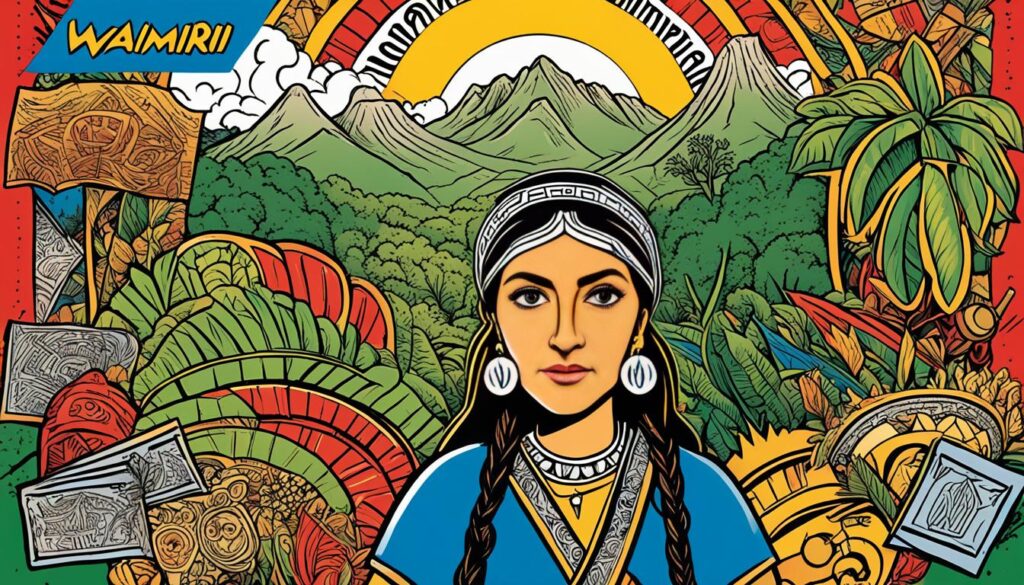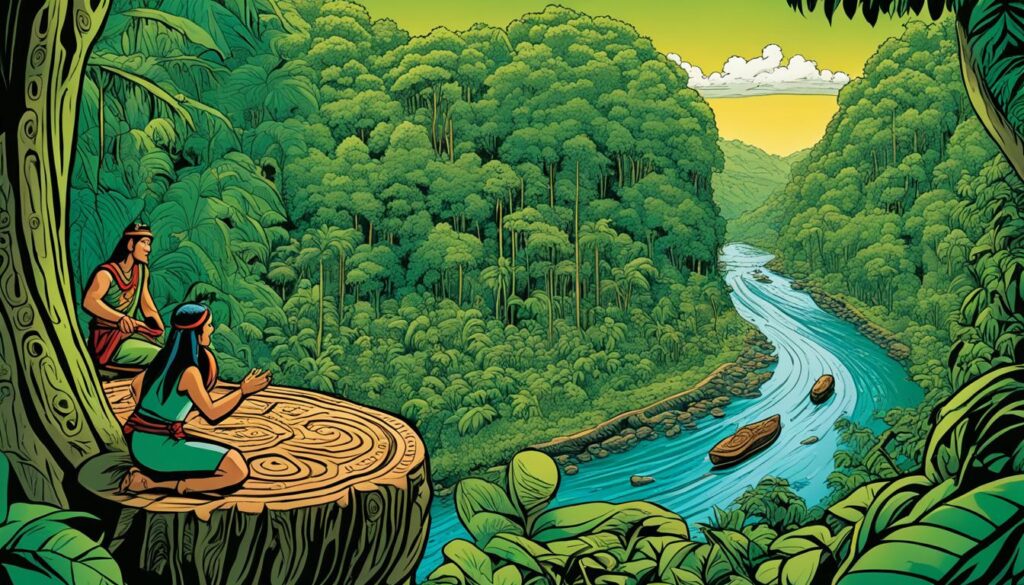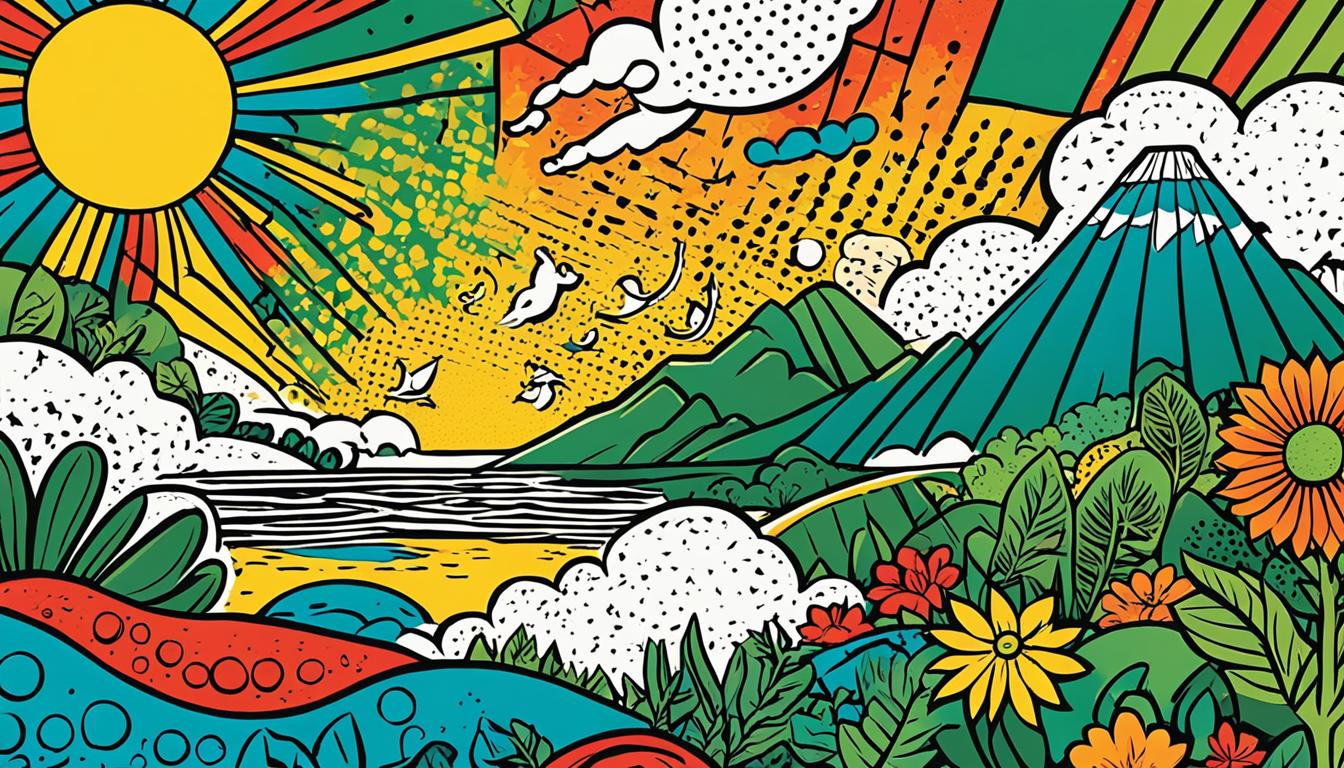Did you know that the Waimiri-Atroarí language, an indigenous language spoken in Brazil, is classified as an endangered language? With the rich linguistic diversity of Brazilian languages and the unique cultural heritage of indigenous communities, the preservation of languages like Waimiri-Atroarí takes on immense importance. In this article, we will explore the significance of the Waimiri-Atroarí language, its linguistic features, the challenges it faces, and the ongoing efforts for language revitalization and preservation.
Language Family and Linguistic Features of Waimiri-Atroarí
The Waimiri-Atroarí language is part of the Carib language family, specifically belonging to the Guiana area group. This language exhibits unique linguistic features that make it distinct and fascinating.
In terms of phonology, Waimiri-Atroarí has a diverse range of consonants and vowels, contributing to its rich sound system. This intricate phonological structure adds depth and complexity to the language.
The morphology of Waimiri-Atroarí is characterized by various grammatical categories, including adjectives, verbs, adverbs, postpositions, particles, and case markings. Additionally, the language showcases a complex system of pronouns that can be used in both subject and object positions. These linguistic features contribute to the expressive nature of the Waimiri-Atroarí language.
Sample Waimiri-Atroarí Pronouns:
1st person singular: i
1st person plural inclusive: upe
2nd person singular: me
2nd person plural: akari
3rd person singular: nika
3rd person plural: anika
Furthermore, the morphology of the Waimiri-Atroarí language encompasses nouns of possession, relational and derivational morphemes, allowing for precise and nuanced expression. These linguistic intricacies demonstrate the depth and richness of the Waimiri-Atroarí language.
Historical and Cultural Significance of Waimiri-Atroarí Language
The Waimiri-Atroarí language holds great historical and cultural significance as it is a vital part of the indigenous culture in Brazil. The Waimiri-Atroarí people have faced numerous challenges in preserving their language and cultural heritage, including conflicts with non-indigenous people and the exploitation of their land. Despite these challenges, the Waimiri-Atroarí community has worked towards revitalizing and preserving their language through linguistic documentation, education, and community initiatives.
The Waimiri-Atroarí language plays a crucial role in the transmission of cultural knowledge, traditions, and identity. It is the medium through which indigenous stories, myths, rituals, and oral histories are shared and passed down through generations. The language embodies the rich cultural heritage of the Waimiri-Atroarí community, reflecting their unique worldview, values, and connection to the land.

Image depicting the Waimiri-Atroarí people, showcasing the cultural heritage associated with the Waimiri-Atroarí Language
The preservation of the Waimiri-Atroarí language is crucial for maintaining the identity and autonomy of the Waimiri-Atroarí people. Language is not merely a means of communication but a fundamental aspect of indigenous cultural sovereignty. It serves as a powerful tool for self-expression, cultural expression, and resistance against the erasure of indigenous cultures.
Furthermore, the Waimiri-Atroarí language is deeply intertwined with the natural environment and indigenous ecological knowledge. Indigenous languages often contain unique terminology and concepts related to land, plants, animals, and spiritual beliefs, providing invaluable insights into sustainable relationships with nature. Preserving the Waimiri-Atroarí language is essential for safeguarding this knowledge and promoting a holistic approach to environmental conservation.
“Language is a fundamental pillar of cultural heritage. Preserving the Waimiri-Atroarí language is not only about linguistic diversity but also about the preservation of indigenous culture, knowledge, and worldviews that are integral to the sustainable future of our planet.”
Linguistic Diversity and Cultural Heritage
The Waimiri-Atroarí language is part of Brazil’s diverse linguistic landscape, contributing to the country’s rich cultural heritage and linguistic diversity. Brazil is home to a multitude of indigenous languages, each representing a unique expression of cultural identity and belonging. The Waimiri-Atroarí language stands as a testament to the resilience and strength of indigenous communities and their ongoing struggle for cultural preservation and recognition.
Language Preservation Efforts
The Waimiri-Atroarí community, in collaboration with linguistic experts and cultural organizations, has undertaken various initiatives to preserve and revitalize their language:
- Linguistic documentation: Comprehensive documentation efforts have been carried out to record and document the grammar, vocabulary, and linguistic features of the Waimiri-Atroarí language. This documentation serves as a valuable resource for linguistic research and language revitalization programs.
- Educational programs: The development of educational programs that incorporate the Waimiri-Atroarí language as part of the curriculum has been instrumental in ensuring the transmission of the language to younger generations. These programs aim to empower Waimiri-Atroarí youth and strengthen their cultural identity.
- Community initiatives: The Waimiri-Atroarí community actively engages in community-driven initiatives to promote the use and revitalization of their language. These initiatives include language learning workshops, cultural events, and intergenerational language exchange programs.
Through these language preservation efforts, the Waimiri-Atroarí people strive to safeguard their cultural heritage, strengthen their sense of identity, and reclaim their rightful place within Brazilian society.
Language Endangerment and Revitalization Efforts
The Waimiri-Atroarí language, classified as an endangered language, faces challenges due to the decreasing number of speakers and the influence of Portuguese. However, concerted efforts have been made to revitalize and preserve this important indigenous language.
Linguistic documentation has played a crucial role in recording and documenting the grammar, vocabulary, and linguistic features of the Waimiri-Atroarí language. This documentation serves as a valuable resource for language revitalization initiatives and helps ensure the accurate transmission of the language to future generations.
The Waimiri-Atroarí community has implemented various language revitalization programs to promote the use of the language among younger generations. These initiatives include native-language education, language immersion programs, and community-driven efforts to create a supportive environment for the language.
“Language revitalization is not just about preserving words; it’s about preserving culture and identity. Revitalizing the Waimiri-Atroarí language is a vital step in preserving our rich indigenous heritage for generations to come.” – Representative of the Waimiri-Atroarí community.
Through these linguistic initiatives, the community aims to create opportunities for language transmission and encourage the active use of the Waimiri-Atroarí language in everyday life. By promoting intergenerational language learning and fostering a sense of pride and ownership, the Waimiri-Atroarí community is making significant strides in revitalizing their endangered language.
Language Revitalization Efforts
| Initiative | Description |
|---|---|
| Native-Language Education | Integrating the Waimiri-Atroarí language into formal education systems and curriculum to ensure its transmission and recognition. |
| Language Immersion Programs | Organizing immersive language programs that provide opportunities for community members, especially children, to be fully immersed in the language through various interactive activities. |
| Community Initiatives | Engaging the Waimiri-Atroarí community in language-related initiatives, such as cultural events, language festivals, and intergenerational language exchange programs. |
In combination with language documentation, these revitalization efforts contribute to the preservation and revitalization of the Waimiri-Atroarí language, ensuring its survival and the continued expression of the unique cultural heritage it represents.
Current Status and Challenges of Waimiri-Atroarí Language
The Waimiri-Atroarí language occupies a unique position, characterized by a dual nature of stability and vulnerability. While Ethnologue considers the language stable, UNESCO classifies it as vulnerable. This classification emphasizes the challenges faced by the Waimiri-Atroarí people in preserving and revitalizing their linguistic heritage.
One of the chief challenges is the encroachment of Portuguese, the dominant language in Brazil. The pressure to conform to the national language puts the Waimiri-Atroarí language at risk of being overshadowed and eventually lost. Additionally, the rapid spread of globalization poses linguistic threats, as the younger generation increasingly adopts global languages and cultural influences.
The development projects within the Waimiri-Atroarí Indigenous Area further compound the challenges faced by the language. These endeavors often result in cultural displacement and disrupt the traditional way of life, making it harder to pass down the language to future generations. The language not only faces external threats but also internal pressures caused by socio-economic and environmental changes.
Efforts are underway to address these challenges and safeguard the language’s long-term preservation and revitalization. Initiatives focus on documentation, education, and community engagement to instill pride and practical use of the Waimiri-Atroarí language. By empowering the community and fostering cultural preservation, there is hope for sustainable language revitalization.
Preserving the Waimiri-Atroarí language goes hand in hand with preserving their cultural heritage. It is vital to recognize the intrinsic value of linguistic diversity and ensure its continued existence for generations to come.
The Waimiri-Atroarí people’s perseverance in the face of challenges highlights their unwavering commitment to cultural preservation. They strive to reclaim their linguistic identity and celebrate the richness of their heritage. With ongoing efforts and support, the Waimiri-Atroarí language can thrive alongside other languages, contributing to the preservation of linguistic diversity in Brazil and the broader global context.

Conclusion
The Waimiri-Atroarí language holds immense value as a cultural and linguistic heritage of Brazil’s indigenous communities. Despite facing challenges and threats, the Waimiri-Atroarí people have shown resilience and determination in preserving and revitalizing their language.
Through linguistic documentation, education, and community initiatives, efforts are being made to ensure the survival and transmission of the Waimiri-Atroarí language for future generations. Language preservation is crucial as it not only sustains indigenous cultural heritage but also contributes to the rich linguistic diversity of Brazil and the wider Amazon rainforest region.
The Waimiri-Atroarí community’s commitment to language revitalization serves as an inspiration for others facing similar challenges. By continuing to document, educate, and promote the use of the Waimiri-Atroarí language, they are securing a vibrant future for their cultural identity and reinforcing the importance of linguistic diversity in our global society.
FAQ
What is the Waimiri-Atroarí language?
The Waimiri-Atroarí language is an indigenous language spoken by the Waimiri-Atroarí people in Brazil. It belongs to the Carib language family and is the only representative of the Yawaperí family.
Where is the Waimiri-Atroarí language primarily spoken?
The Waimiri-Atroarí language is primarily spoken in the Waimiri-Atroarí Indigenous Area, located in the southeastern part of the state of Roraima and the northeastern part of the state of Amazonas.
How is the Waimiri-Atroarí language classified?
The Waimiri-Atroarí language is categorized as a vulnerable language by UNESCO and a stable language by Ethnologue.
What are the linguistic features of the Waimiri-Atroarí language?
The Waimiri-Atroarí language has distinct phonological features, including a range of consonants and vowels. It exhibits a complex system of pronouns and a variety of grammatical categories such as adjectives, verbs, adverbs, postpositions, particles, and case markings.
What is the historical and cultural significance of the Waimiri-Atroarí language?
The Waimiri-Atroarí language holds great historical and cultural significance as it is a vital part of the indigenous culture in Brazil. It plays a crucial role in the transmission of cultural knowledge, traditions, and identity.
Is the Waimiri-Atroarí language endangered?
Yes, the Waimiri-Atroarí language is classified as an endangered language due to the decreasing number of speakers and the influence of Portuguese.
What efforts are being made to revitalize and preserve the Waimiri-Atroarí language?
The Waimiri-Atroarí community has implemented linguistic documentation, education, and community initiatives to revitalize and preserve their language. These efforts include recording and documenting the language, native-language education, language immersion programs, and promoting language use among younger generations.
What are the current challenges faced by the Waimiri-Atroarí language?
The Waimiri-Atroarí language faces challenges such as the pressure of Portuguese, the influence of globalization, and the impact of development projects on their indigenous land.
What is the current status of the Waimiri-Atroarí language?
The current status of the Waimiri-Atroarí language is a mix of stability and vulnerability. While it is considered stable by Ethnologue, it is classified as vulnerable by UNESCO.
Why is the preservation of the Waimiri-Atroarí language important?
The preservation of the Waimiri-Atroarí language is important as it is a cultural and linguistic heritage of Brazil’s indigenous communities. It contributes to the rich linguistic diversity of Brazil and the wider Amazon rainforest region.
